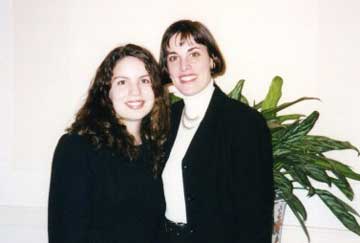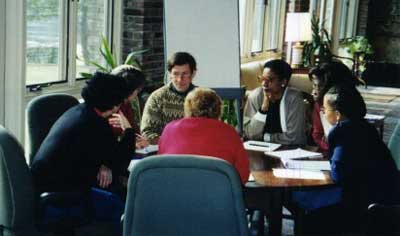
|
|
Dania Diaz (left), program manager, and Lori Roth, executive director of Columbia Business School's Institute for Not-for-Profit Management (INM).
|
Where can the officers of not-for-profit organizations learn the skills they need to run the business end of their operations? At the Columbia Business School's Institute for Not-for-Profit Management (INM). Now in its 25th year of service to New York City, the tri-state area and the international community, INM will offer two sessions of seminars in April.
The Middle Management Program for Youth Service Organizations, a seven-day program that explores basic management disciplines with the mid-level managers and executive directors of community-based youth organizations, starts April 14 at the Morningside Heights campus and continues in residence at Arden Homestead in Harriman, NY. The application deadline is Tuesday, March 14, 2000. The Leadership Development Program, an intensive, five-day program designed to enhance the leadership capacity of executive directors and senior level managers runs May 712, 2000. Its application deadline is March 28, and the sessions will be held at the Olde Mill Inn in Basking Ridge, NJ.
"Non-profits need to develop strong business skills," said Lori Roth, INM's executive director. "We want them to see that they don't have to live in triage mode; they can learn to manage strategically to fulfill the mission of their organization."
Mike Fenlon, a professor at the Columbia Business School and co-designer of the Leadership Development Program agrees with Roth and adds that working with the not-for-profit managers in the INM program has been one of the high points of his career. "We wanted our programs to be transformational experiences that participants can look back on six months or a year later as something that significantly developed their careers and built their identity and capacity as leaders," he said.
In addition to the two upcoming seminars, INM also offers annually a 19-day Executive Level Program that runs from January through March; a seven-day Middle Management Program for Community Development Organizations, which runs from December to February; and a general Middle Management Program that runs from October through December.
The need to develop the business skills in not-for-profit managers was first recognized by a group of corporate and private philanthropies. They invited bids from some of academe's top business schools to develop a non-profit program. Columbia won the contract and formed the Institute.
The core of each program is a major paper, called the Strategic Management Project, which the Institute uses to help participants focus on their agency's issues and apply the management techniques they have learned. The Executive Level Program was based on Columbia's Executive MBA, in a much-concentrated format.
Roth was brought in as INM director in 1995. She has rejuvenated the programs, adding the Leadership Development seminar that ran for the first time in spring 1999 and attracting donors for a significant increase in the scholarship fund. Annual enrollment has grown from a total of 31 participants across two programs in 1995 to 114 participants across five programs in 1999.

|
|
A group discussion during the Executive Level Program includes (clockwise from center) Ralston Deffenbaugh, Jr. of Lutheran Immigration & Refugee Service, Jacqueline Dawson of Reach Into Cultural Heights, Judith Jackson of Services for the Underserved, Gabrielle Kersaint of Haitian Women's Program, Rosalyn Cassar of Urban Pathways, Anna Chang of AIDS Service Center of Lower Manhattan, and Anne Teicher of Neighborhood Coalition for Shelter.
|
"The non-profit training sector offers a variety of workshops for agencies and technical assistance providers," said Roth, "but INM offers a unique service. We provide intensive, multi-disciplinary programs in both open enrollment and customized formats. These programs apply business theory to the actual challenges facing individual not-for-profit agencies."
INM also offers substantial financial aid based on need to organizations interested in their seminars. Approximately 75 percent of their programs' participants receive some financial assistance on a sliding scale. According to INM Program Manager Dania Diaz, the INM staff will work with agencies with greater need to identify sponsors who will provide additional funding. New York's Local Initiative Support Corporation (LISC) and Upper Manhattan Development are two such sponsors. "We really try not to turn any agency away because of need," said Diaz.
Approximately 50 percent of the INM's program participants are from Manhattan (10 percent of the alumni are organizations based in the Morningside Heights/Upper Manhattan area), 20 percent are from the Brooklyn, 13 percent are from the Bronx, and the remainder are from all over the US and overseas. For large public service and non-profit agencies, like recent client the US Customs Service, INM will go in as consultants and design custom programs.
A recent open house to promote the upcoming sessions was filled with excitement and anticipation. Middle Management Program alumnus Michael Trotter from We Stay/Nos Quedamos, a Bronx-based community development organization, complimented the INM's excellent professors who "helped me explore my weaknesses and develop my strengths." Trotter was subsequently put in charge of a million-dollar construction project that his agency received from HUD.
Donna Marie Gibbons from the Manhattan Valley Development Corp. commented on the range of people that attended the Executive Level seminar with her, "There were people from all different walks of life and kinds of organizations, and they all brought something important to our discussions," she said.
INM newcomer Jose Torres of East Harlem's El Barrio Operation Fight Back, a family services program, was anxious for the Middle Management Program to begin. A youth services veteran, Torres was recently appointed to head up scheduling for tenant services managers. "My boss sent me here to find out how to work with managers, and that's one thing I am looking forward to learning how to work side-by-side with them for the clients' benefit," he said.
"In this day and age, not-for profit organizations must operate with increased efficiency and effectiveness," added Roth. "The Institute for Not-for-Profit Management's intensive programs provide managers with the strategic perspective and practical tools required to accomplish these goals."
For more information about the Institute for Not-for Profit Management (INM), please contact them at (212) 854-6018/4226, fax (212) 316-1473 or inm@columbia.edu. You can also visit their website at http://www.gsb.columbia.edu/execed/not-for-profit/index.html
|
